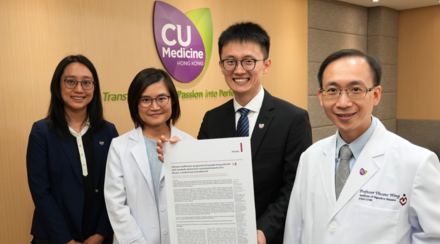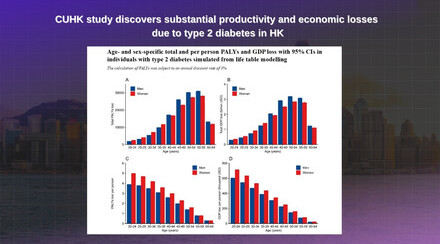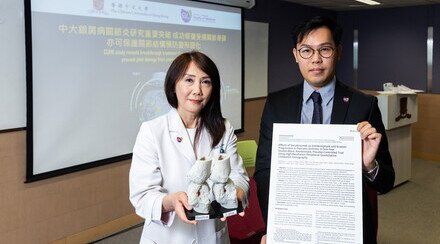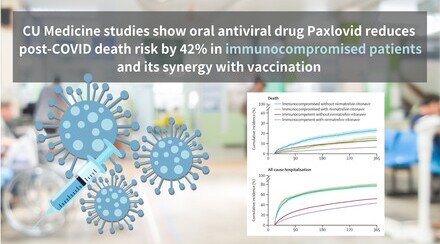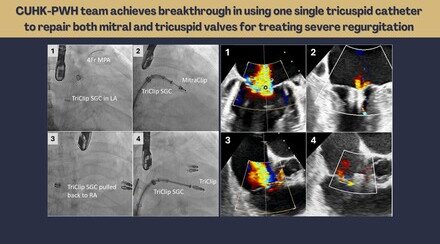CU Medicine Study Shows Liver Injury is Common and Prognostic in COVID-19 Patients
Researchers from the Faculty of Medicine at The Chinese University of Hong Kong (CU Medicine) have recently conducted a study to investigate the impact of liver injury on clinical outcomes in COVID-19 patients. Data from over 1,000 COVID-19 patients in Hong Kong was analysed and liver injury was found in around 20% of the patients. The estimated risk of COVID-19 patients with liver injury experiencing adverse clinical outcomes such as intensive care unit (ICU) admission, use of invasive mechanical ventilation or death was almost eight times of other patients. It is suggested that liver function monitoring is important regarding its association with adverse clinical outcomes in COVID-19 patients. These findings have been published recently in the world-renowned medical journal Gut.
In view of the high prevalence of various chronic liver diseases in the Asia-Pacific region, CU Medicine’s researchers led a group of experts from Mainland China, Japan, Singapore and Australia to issue a position statement on the management of COVID-19 patients with liver derangement. The statement has been published recently in another international medical journal The Lancet Gastroenterology & Hepatology.

Researchers from CU Medicine have recently analysed data from over 1,000 COVID-19 patients in Hong Kong and liver injury was found in around 20% of the patients. (From left) Professor Vincent WONG, Director, Cheng Suen Man Shook Centre for Hepatitis Research and Head, Division of Gastroenterology and Hepatology, Department of Medicine and Therapeutics at CU Medicine; Professor Grace WONG, Professor at the Division of Gastroenterology and Hepatology; and Dr Terry YIP, post-doctoral fellow of the Department of Medicine and Therapeutics at CU Medicine..
About 20% of COVID-19 patients in Hong Kong were found to have liver injury
Liver injury, in the form of hepatitis, cholestasis or both, can be observed in patients infected by different coronaviruses. For the territory-wide study in Gut, researchers from CU Medicine analysed the data from 1,040 COVID-19 patients in Hong Kong. It was found that the level of liver enzyme alanine aminotransferase (ALT) or aspartate aminotransferase (AST) was elevated in 23% of the COVID-19 patients, which indicated liver damage.
An association between liver injury and the chance of adverse clinical outcomes was also identified. Overall, 53 (5.1%) were admitted to ICU, 22 (2.1%) received invasive mechanical ventilation, and 4 (0.4%) died. Among them, 71% had liver injury. The analysis indicated that the estimated risk of patients with liver injury having adverse clinical outcomes is eight times of others.
First author of the study, Dr. Terry Cheuk Fung YIP, post-doctoral fellow of the Department of Medicine and Therapeutics at CU Medicine, explained, “Our study shows that liver injury was common in COVID-19 patients. Although the exact impact of the novel virus on the liver has not been well elucidated so far, our findings proved that the chance of patients with liver injury having adverse clinical outcomes is obviously higher than that of others. This shows that liver injury is prognostically significant in COVID-19 patients.”
Professor Grace Lai Hung WONG, Professor, Division of Gastroenterology and Hepatology, Department of Medicine and Therapeutics at CU Medicine, added, “Liver injury is possibly caused by systemic inflammation and adverse drug reactions in severe COVID-19 patients who have been receiving different medical treatments. As the degree of liver injury could be impacted by coexisting chronic hepatitis in patients, a thorough review of medical history and detailed investigation for concomitant liver diseases are crucial to improve patient outcomes.”
Furthermore, cautious use of appropriate medications with least hepatotoxicity as well as vigilant monitoring of liver biochemistries are recommended in order to minimise liver injury in COVID-19
patients.

Dr Terry YIP states that the analysis indicated the estimated risk of patients with liver injury having adverse clinical outcomes is eight times of others.

Professor Grace WONG recommends cautious use of appropriate medications with least hepatotoxicity in order to minimise liver injury in COVID-19 patients.

Professor Vincent WONG states that the Asia Pacific position statement led by CU Medicine on the management of COVID-19 patients with liver derangement will help to treat patients with COVID-19 more effectively.
CU Medicine leads Asia-Pacific experts to issue a position statement on the management of COVID-19 patients with liver derangement
As the pandemic continues and CU Medicine’s study has proved that the risk of adverse clinical outcomes in COVID-19 patients is closely related to liver health, it would be clinically helpful to provide practice recommendations for various common clinical scenarios of liver derangement, especially in the Asia-Pacific region where the prevalence of liver diseases is the highest worldwide. According to the World Health Organization, liver diseases caused 4.6% of deaths in the Asia-Pacific region in 2015,compared with 2.7% in the USA and 2.1% in Europe.
In response to this utmost need, the Asia-Pacific Working Group for Liver Derangement, led by the hepatologists from CU Medicine, published an Asia-Pacific position statement in June this year on the management of COVID-19 patients who have been or are at risk of developing liver derangement. Clinical scenarios covered in the statement included the precautions for the use of pharmacological treatment for COVID-19 in patients with liver derangement, for example liver test should be conducted twice weekly in patients on potentially hepatotoxic medication, those with pre-existent liver disease, and more frequently in any patients with abnormal liver function.
The statement also proposed the assessment and management of patients with hepatitis B or hepatitis, non-alcoholic fatty liver disease, liver cirrhosis, and liver transplantation during the pandemic.
Professor Vincent Wai Sun WONG, Director, Cheng Suen Man Shook Centre for Hepatitis Research and Head, Division of Gastroenterology and Hepatology, Department of Medicine and Therapeutics at CU Medicine, stated, “It is common to encounter patients with COVID-19 who have abnormal liver function. As the causes of liver impairment in COVID-19 patients and the liver toxicity of the new antiviral drugs are to be studied, experts in our group joined hands to give recommendations for the clinical management of patients with liver derangement, with the hope of providing the most appropriate care at this critical time. We strongly believe that these recommendations will be beneficial to the healthcare professionals in the Asia-Pacific region as well as around the world.”









